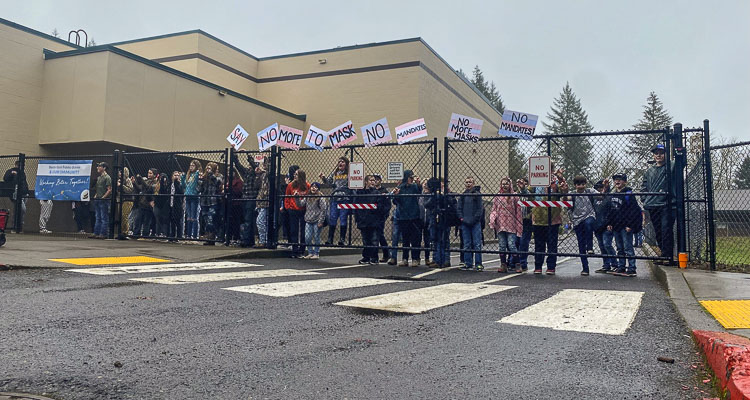
Elizabeth Hovde of the Washington Policy Center calls on Gov. Jay Inslee to announce Washington’s mask-free day
Elizabeth Hovde
Washington Policy Center
In a Wednesday press conference, his 711th day of emergency rule, Gov. Jay Inslee announced he will end his outdoor mask mandate at gatherings of 500 people or more on Feb. 18. That’s how he led into news that his COVID-19 emergency mask requirements covering schools, indoor public spaces and businesses will remain in effect — for now.

Stay tuned, however. If hospitalizations and case rates continue to fall over the next week, Inslee might announce Washington’s mask-free day, joining other Democratic governors . (See the latest on state mandates here.)
Changes in COVID-19 policies come amid declining hospitalizations and deaths, vaccine availability, and a growing realization that the virus is never going away and that Americans need to return to normal life. There is also growing concern about the harm mask policies may have on child development. (Read more about that discussion here, here and here.)
In announcing possible policy shifts, Inslee said, “We have not changed, but the virus has changed.”
Well, not really. The virus has evolved but not ended, as leaders promised. It has become more contagious but less deadly, and masks seem to do little, if anything, to stop the spread.
Given that information, Washingtonians are more confident about assessing personal risks. Many think the risk of forcing masks hurts a child’s development, security and happiness, and is more harmful than the threat of a less-severe illness.
Even the CDC, early on, argued against forced, mass masking. On Feb. 29, 2020, U.S. Surgeon General Jerome Adams wrote “STOP BUYING MASKS!” in an all-caps message on Twitter, saying they are “NOT effective” in preventing the general spread of COVID-19. Perhaps most notably, Dr. Anthony Fauci told us masks wouldn’t help the average man. “When you’re in the middle of an outbreak,” he said, “wearing a mask might make people feel a little bit better, and it might even block a droplet, but it’s not proving the perfect protection that people think that it is, and, often, there are unintended consequences,” he continued.
Later, we learned the no-mask-needed advice was issued to preserve supply. Many felt lied to and haven’t trusted “the experts” ever since.
Now, about two years later, we are back to where Fauci began: Mask hygiene theater might make people feel better, but it does not keep the virus contained.
Studies suggest, however, some benefit of wearing masks against community spread. (See here, here and here.) The amount of benefit is debatable and varies. New, COVID-19 specific information comparing states and countries with different mask policies is ongoing and helpful.
Unlike Inslee, state Superintendent of Public Instruction Chris Reykdal said he supports making masks optional in schools. “It’s time to make the change,” he said. “Our schools are ready to make this transition.”
What I hear Inslee and state health officials getting most wrong in regard to mask mandates is that people find them inconvenient. I don’t think that’s it. Instead, people see that mask mandates are not stopping community spread, while they do have a concerning impact on child development and social life, in general.
The science hasn’t changed, but our understanding of the usefulness and trade-offs of forced mask-wearing has. That is the reason Washington state, like most other states now, should end its mask mandate.
Elizabeth Hovde is a policy analyst and the director of the Centers for Health Care and Worker Rights at the Washington Policy Center. She is a Clark County resident.





It’s not a law. We don’t need his permission.
On the contrary, masks of the proper type and worn properly are profoundly effective at stopping spread.
Nonetheless, Omicron has proven to be roughly as deadly as the flu–about 1/10th to 1/20th as deadly as the first COVID strain–which, given ever improving treatments, is something we as a society are more willing to accept. For this reason, it will be time to drop the mandates of all types soon.
Let us just hope worse strains do not emerge, so we can put this virus into the endemic, seasonal and low-mortality box.
Masks do nothing. But you stay in line with good King Inslee
Masks do absolutely nothing to slow the spread of a virus. NOTHING! Don’t believe me? Let’s ignore, fo a moment, the plethora of scientific studies which state the same thing. Take a puff on a cigarette then exhale and watch the mask do nothing to stop the smoke. A virus is 100x smaller than a smoke particle. End of debate.
Inslee needs to get the permission of the Teacher’s Union and a few others before he drops the mandate…